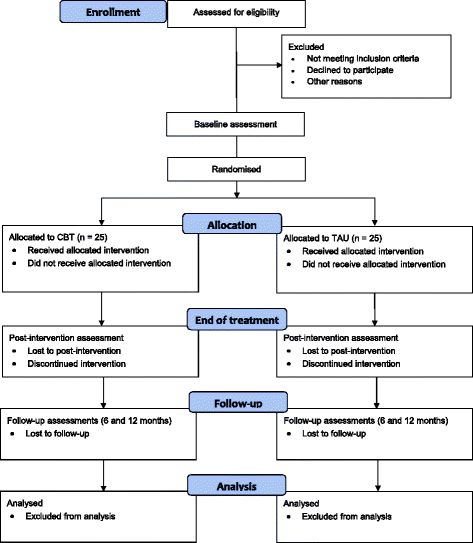Cognitive behavioural treatment for mild Alzheimer's patients and their caregivers (CBTAC): study protocol for a randomized controlled trial
- PMID: 26576633
- PMCID: PMC4650298
- DOI: 10.1186/s13063-015-1043-0
Cognitive behavioural treatment for mild Alzheimer's patients and their caregivers (CBTAC): study protocol for a randomized controlled trial
Abstract
Background: About 90 % of all persons with mild Alzheimer's disease experience neuropsychiatric symptoms, most frequently apathy, depression, anxiety and irritability. These symptoms are associated with greater morbidity, a reduced quality of life for the patient, an increased burden and depression for the caregiver, and higher costs of care and nursing home placement. Psychosocial interventions based on behaviour therapy represent the most efficacious treatment of neuropsychiatric symptoms. However, there is no study, to our knowledge, that has evaluated a multicomponent treatment programme based on comprehensive, cognitive behavioural therapy (CBT). This randomized controlled trial aims to evaluate a CBT-based treatment programme consisting of 8 modules and 25 sessions.
Methods/design: Fifty patients with mild Alzheimer's disease alone or with mild mixed dementia (Alzheimer's disease and vascular dementia) who have any neuropsychiatric symptom will be included. A caregiver must be available. The patients and their caregivers will be randomized to either the CBT-based intervention group or to the control condition group, which receives treatment as usual. The primary outcome measure is depression in the patient with Alzheimer's disease. The secondary outcome measures for a person with Alzheimer's disease are other neuropsychiatric symptoms, quality of life and coping strategies. The secondary outcome measures for a caregiver are caregiver's burden, depression, anxiety, anger, quality of life and coping strategies. Neuropsychological testing includes tests of cognitive function and activities of daily living and a global clinical assessment of severity. Participants in both groups will be assessed before and after the treatment phase (lasting approximately 9 months). Follow-up assessments will take place 6 and 12 months after treatment. All assessments will be conducted by blinded assessors.
Discussion: This trial has the potential to establish an empirically based psychological treatment for non-cognitive symptoms that reduce the quality of life of a person with dementia and a caregiver. This treatment approach focuses not only on the person with dementia, but also on the caregiver and on the dyad. The treatment manual will be published and training workshops will be offered, so that the information can be widely spread among healthcare professionals.
Trial registration: ClinicalTrials.gov NCT01273272.
Figures
References
Publication types
MeSH terms
Associated data
LinkOut - more resources
Full Text Sources
Other Literature Sources
Medical


